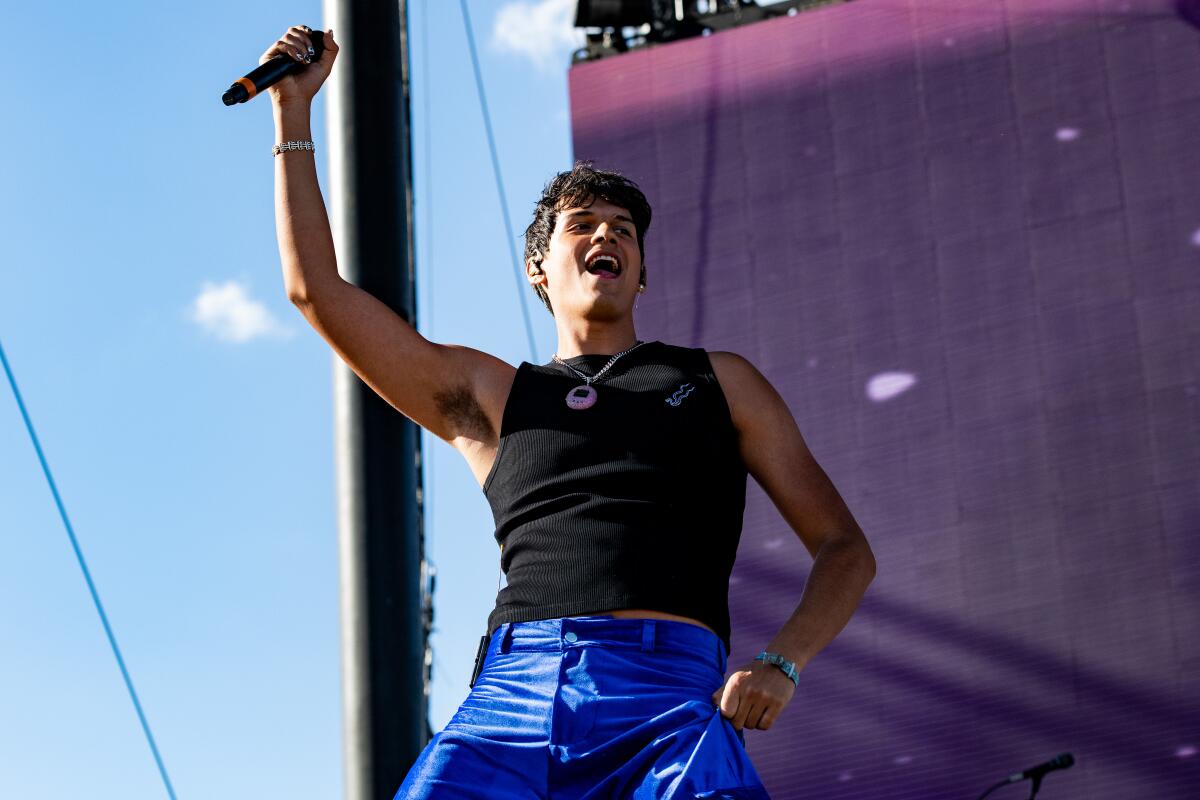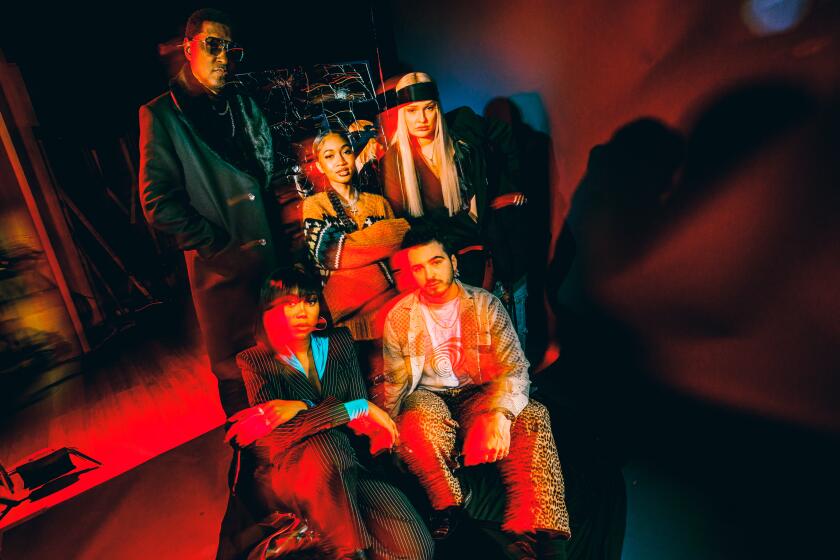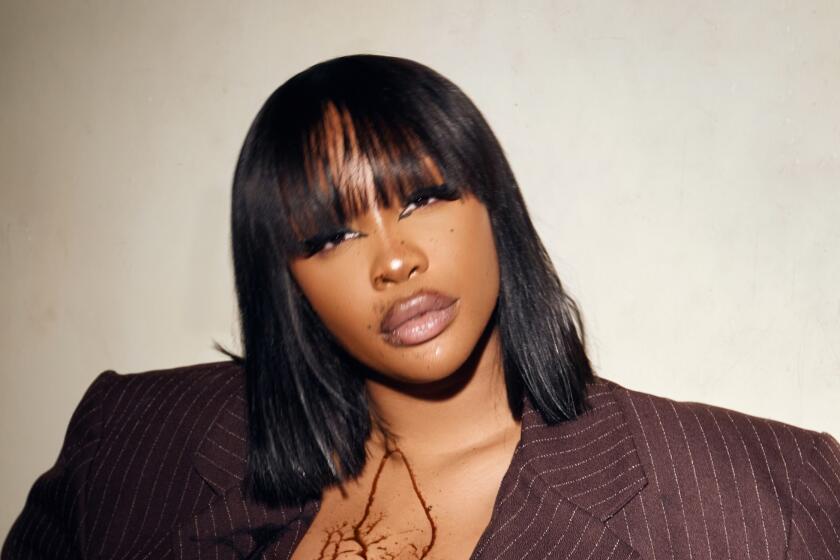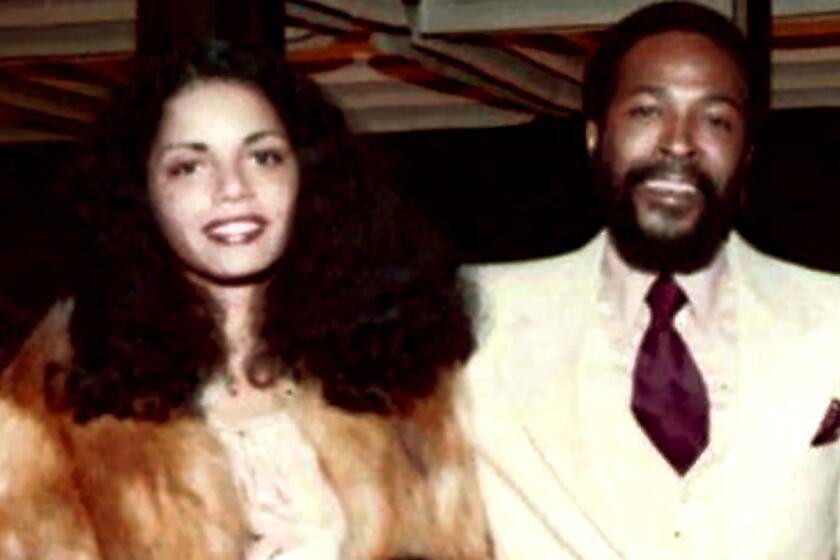Omar Apollo on Catholic guilt, body image and crying after concerts

- Share via
Omar Apollo makes dreamy bilingual soul music about his life as a gay man, as a son of Mexican immigrants and as a kid who grew up in small-town Indiana before moving to Los Angeles to pursue his career.
He also posts A-plus tweets.
Last month, Apollo went viral on Twitter after a fellow user asked whether he was “another queerbaiting singer” — the type, as the user went on, who might say “i don’t label myself let me wear cropped and paint my nails and say i find another guy hot.”
Apollo’s priceless reply isn’t quotable here, but suffice it to say it made his sexual identity clear.
Of course, the NSFW tweet wouldn’t have traveled as widely as it did if Apollo, 25, weren’t already known as a singer and songwriter of uncommon style and sensitivity. His talents are on display throughout his excellent major-label debut, “Ivory,” which spun off a TikTok hit in the Motown-ish “Evergreen (You Didn’t Deserve Me at All)” and which led to a best new artist nomination at the 65th Grammy Awards, set for Feb. 5. He’s been thrilling fans all year on the road as well, including at a sold-out show in November at L.A.’s Greek Theatre.
From a 12-time winner to first-time nominees, Kim Petras, Muni Long, Babyface, Blake Slatkin and Nija Charles discuss their paths to the Grammy Awards.
Asked whether he’d seen Lady Gaga and Bradley Cooper’s remake of “A Star Is Born” — which used the Greek for the pivotal scene in which Gaga belts out “Shallow” for the first time — Apollo says he saw the movie but didn’t know it was shot at the same venue he’d just played. “The movie’s very sad. I cried on the plane,” he says. “I was embarrassed. The guy next to me was like, ‘You good?’ I was like, ‘No, man.’ ”
These are edited excerpts from the conversation.

You’ve been very busy lately.
Two tours in one year. I will never do that again. Your circadian rhythm’s all messed up. You have to take care of two little vocal folds in your throat to the point where you have to watch what you eat. It’s so strict. I miss eating late and not worrying about my voice.
Let’s say you play a show and come offstage around 11. What happens then?
You’re supposed to not talk, but then I’m so on because I just got offstage and the dopamine release from my brain has me on this high. I can’t just go into a room by myself and be silent. So I have to interact or at least have a guitar or something by me. Something needs to be happening. I’ve gone straight into the Suburban and lost my mind, crying on the way home.
That sounds dark.
It gets dark. I see why these artists struggle on tours. It’s inhumane. I mean, it’s rewarding. You just have to really take care of yourself and learn how to do it.
You’re nominated for best new artist. Growing up in Indiana, did you feel like the Grammys were something open to you or like this mysterious, far-off organization?
From the Midwest, everything feels like that. It totally felt far-fetched. Then you move to L.A. and New York, and your friend is like, “Oh, yeah, my dad directed [that movie].” But over there it’s like drugs or meth — that’s the vibe.
What were you like in high school? Did you play sports at all?
I played basketball. I played soccer. I’m [6-foot-5], but I couldn’t hoop.
‘SOS’ evokes memories of ‘The Miseducation of Lauryn Hill,’ ‘Beyoncé,’ Rihanna’s ‘Anti’ and even Taylor Swift’s ‘Red.’
You’ve said the Internet’s 2015 album, “Ego Death,” inspired you to start playing music.
I was working at McDonald’s when I found that album. I got the job so I could save up for studio equipment. It was probably around three weeks into my job when I found the album and I was like, “Oh, I’m gonna go to the pawn shop after work and pick up a guitar.” [Later] I got a job at Guitar Center, and every Sunday there’d be some really good players that would come in and I’d just ask questions.
Your music has echoes of Smokey Robinson and Stevie Wonder and Prince. Was that music you heard in your house as a kid?
Those are the artists I was drawn to once I had access to internet and stuff. My parents introduced me to Pedro Infante, who’s a great singer in Mexico. There’s a song called “Cien Años” that I always go back to. Then they introduced me to Juan Gabriel, Los Panchos, Los Bukis. That gave me a soulful interest, and I think that’s why I was drawn to Prince and Donny and all that stuff.
Can you remember hearing a Donny Hathaway song for the first time?
I was like 19, maybe. “You’ve Got a Friend.” I think James Taylor wrote that. [It was Carole King.] But Donny’s was the one.

Why did you move to L.A.?
I was working at Guitar Center. I put out maybe three songs, and they started doing really well on Spotify. I was making like $500 a month. Then it was $600, $800, then $1,000, then $1,200. I was like, “Oh, I can live off of this.” My rent was $140, but I would split it because I lived with four people in an attic.
Four people in an attic? Or you in the attic and the other people somewhere else in the house?
In the attic. Beds spread out. Then I had my studio up there.
You’d have to kick everybody out so you could use the studio.
I’d tell them to please be quiet. You probably can still hear them in the recordings. I was living there and then I moved. There was a lot of smoking going on, and I was like, “I can’t record here.” I mean, I smoked, but not like that. My friend told me I could live with her 30 minutes away. Then I went on tour and she was like, “Hey, my brother’s moving back in.” So I lived in my friend’s basement for three months.
Which was better: attic or basement?
Basement. I was living by myself when I was in the basement. And the attic didn’t have a bathroom. It was such a cold trip to go to the bathroom, two flights of stairs.
Then L.A. at last.
I told my brother — he was working at UPS — I was like, “You wanna move to L.A.?” It wasn’t much thought. I actually like Indiana now more. Back then it felt like there wasn’t much. But now people are making music. It’s pretty sunsets there. And there’s a little lake. You just can’t swim in it.
Toxic?
Probably. I was a little kid when I would swim in it, but my friend bridge-jumped and then he got E. coli.
On “Ivory” you sing in both English and Spanish. How do you decide which language is right for a song?
There’s a song called “En El Olvido,” which is a traditional Mexican mariachi corrido. So I didn’t even think about it — it was Spanish. But then I also have another style, which is called corridos tumbados, where kids like me — their family’s from Mexico, they were born here, they have all the culture — they’ll do the whole thing in Spanish, and then there’ll be a breakdown and there’s cussing in English. When I’m singing R&B and soul, sometimes I throw [Spanish] in. The life that I live is bilingual, mostly English. But I think music’s a reflection of my life.

You grew up in the Catholic Church.
Super Catholic.
Does Catholicism have a place in your songwriting?
I used to have an insane amount of Catholic guilt. I was afraid to say certain things when I was first making music because of it. It was like, “Oh, you’re damning the world to hell.” It’s kind of scary. Eventually I was just like, “These aren’t my thoughts.” What does Jay-Z say? “What you eat don’t make me s—.” I have my views, and I live by my own moral code.
Is religion a part of your life now?
I wouldn’t say I’m religious. When was the last time I prayed? I guess I wrote about praying last night. In a song I was saying that I was praying for somebody, which I think I do — just good intentions for somebody. I don’t know, maybe one day I’ll find something that makes sense. But for now, in the way that I know Catholicism, the way I grew up with it, I don’t think that I could live the way that I want to live if I was a die-hard Catholic.
Do you wish there were a place for you in the Catholic life?
Maybe if their music was better.
Are the aesthetics of religion interesting to you at all?
I like the smells — the incense burning and all that stuff.
Author David Ritz reflects on two of his literary subjects: the great soul singer Marvin Gaye and his late ex-wife and inspiration, Janis Gaye.
You’re pictured without a shirt on the cover of “Ivory.” Is being comfortable with your body a natural thing for you?
Definitely not natural. I used to swim with my shirt on when I was a kid. I’d get one of those tight little Under Armour swim shirts. What happened was, honestly, I went on tour and I think I weighed 220 pounds, and I was looking at photos of myself and I’m like, “Dang, I’m gonna have to be in front of people all the time and constantly look at this photo of me.” I had such a discipline in my work and in my music that I wanted my body to reflect that for me. I was just like, “OK, I’m gonna maybe not eat at 2 a.m. at Taco Bell and actually take care of my body and give it healthy things.” It took years to really get to where I’m at now.
Is your body something you put a lot of energy into maintaining?
Not recently. I’ve been going crazy. I think it’s anxiety. There’s food in front of me, I’m like, “Oh, I have to finish this.”
Some people say that’s because of their mother or their grandmother.
Yeah, my mom, for sure. She wouldn’t let me leave the table unless I finished it.
What do you love to eat?
Sushi. I just found out that I have too much soy in my blood. It was dangerously high. Not dangerously high, I’m exaggerating. I love Italian food, Ethiopian food. The last tour, every place was Caribbean — I had to eat jerk. I have a lot of foodie friends. I was deciding today if I was a foodie or not.
What did you land on?
I used to be. I know the spots, but it’s not like an obsession. I just need something in my body because my hands are shaking.
More to Read
The biggest entertainment stories
Get our big stories about Hollywood, film, television, music, arts, culture and more right in your inbox as soon as they publish.
You may occasionally receive promotional content from the Los Angeles Times.














